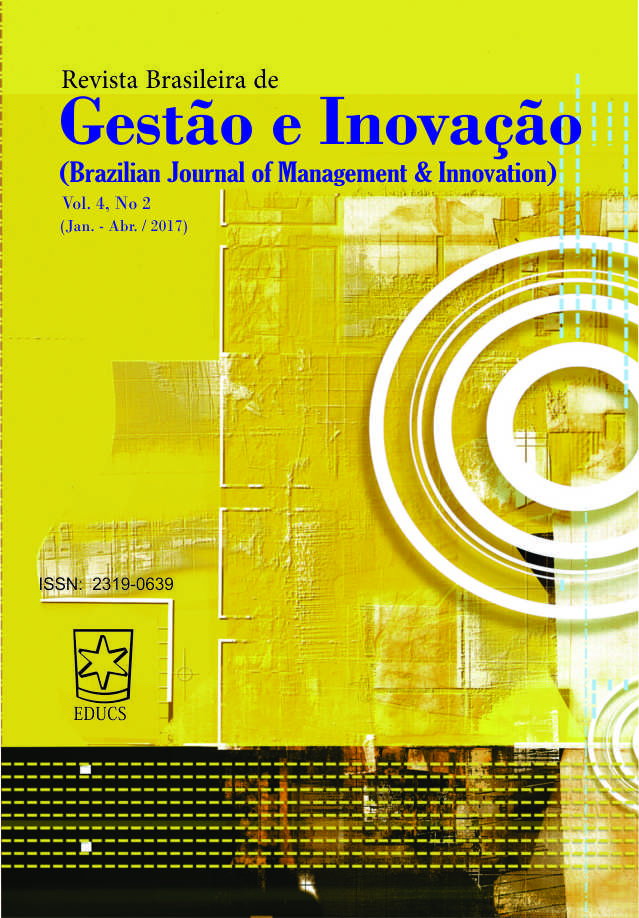ATIVIDADES TURÍSTICAS DE HOTELARIA E RESTAURANTE: ANÁLISE DE RENTABILIDADE EM UM HOTEL DA SERRA GAÚCHA | TOURIST SERVICES PROFITABILITY: ANALYSIS OF HOSTING AND RESTAURANT ACTIVITIES IN A HOTEL FROM SERRA GAÚCHA - BRAZIL
Keywords:
Contabilidade de custos. Custeio por absorção. Custeio variável. Hotelaria. Restaurante.Abstract
O setor de turismo é composto por um conjunto de atividades, que, em sua totalidade, tem grande representatividade na economia do Brasil e vem apresentando crescimento constante ao longo dos últimos anos. A hotelaria está diretamente vinculada à demanda turística ao passo que, apesar de não ser classificada como atividade turística, grande parte das receitas do setor é auferida pelos restaurantes. A eficácia com que estas empresas desempenham suas atividades, de forma especial à gestão de custos, é relevante para que se obtenham resultados satisfatórios mantendo o crescimento do setor turístico. Em vista da importância da Contabilidade de Custos neste cenário, este trabalho tem como objetivo determinar, através dos métodos de custeio variável e absorção, qual das atividades desenvolvidas pelo Hotel Alfa é a que apresenta melhores resultados econômicos para a organização. Com relação à metodologia aplicada, realizou-se um estudo de caso único, descritivo e qualitativo. Para atingir o objetivo proposto, determinaram-se os custos e despesas da empresa e calcularam-se os custos através dos métodos de custeio variável e absorção. Verificou-se que, contabilmente, a atividade de hotelaria apresenta melhores resultados econômicos do que se comparados ao restaurante. Entretanto, através do custeio variável, constatou-se que o restaurante gera uma margem de contribuição positiva. Este método de custeio, apesar de não observar os Princípios Contábeis e não atender às legislações fiscais, apresenta informações gerenciais relevantes que auxiliam na tomada de decisões.
DOI: 10.18226/23190639.v4n2.02
Downloads
Published
How to Cite
Issue
Section
License
The author must guarantee that:
- there is full consensus among all the coauthors in approving the final version of the document and its submission for publication.
- the work is original, and when the work and/or words from other people were used, they were properly acknowledged.
Plagiarism in all of its forms constitutes an unethical publication behavior and is unacceptable. Revista Brasileira de Gestão e Inovação has the right to use software or any other method of plagiarism detection.
All manuscripts submitted to RBGI - Revista Brasileira de Gestão e Inovação go through plagiarism and self-plagiarism identification. Plagiarism identified during the evaluation process will result in the filing of the submission. In case plagiarism is identified in a manuscript published in the journal, the Editor-in-Chief will conduct a preliminary investigation and, if necessary, will make a retraction.
This journal, following the recommendations of the Open Source movement, provides full open access to its content. By doing this, the authors keep all of their rights allowing Revista Brasileira de Gestão e Inovação to publish and make its articles available to the whole community.
RBGI - Revista Brasileira de Gestão e Inovação content is licensed under a Creative Commons Attribution 4.0 International License.
Any user has the right to:
- Share - copy, download, print or redistribute the material in any medium or format, linking to RBGI site.
- Adapt - remix, transform and build upon the material for any purpose, even commercially.
According to the following terms:
- Attribution - You must give appropriate credit, provide a link to the license, and indicate if changes were made. You may do so in any reasonable manner, but not in any way that suggests the licensor endorses you or your use.
- No additional restrictions - You may not apply legal terms or technological measures that legally restrict others from doing anything that the license permits.
#RBGI







